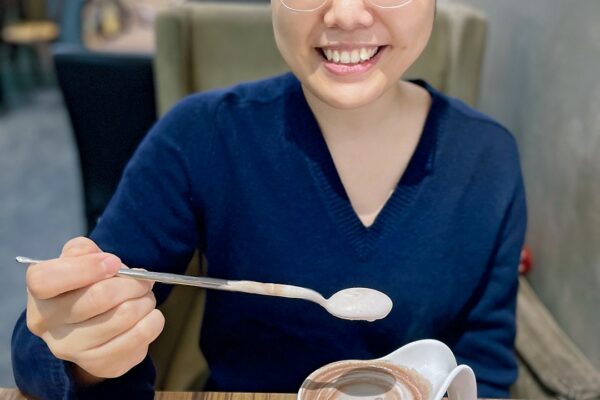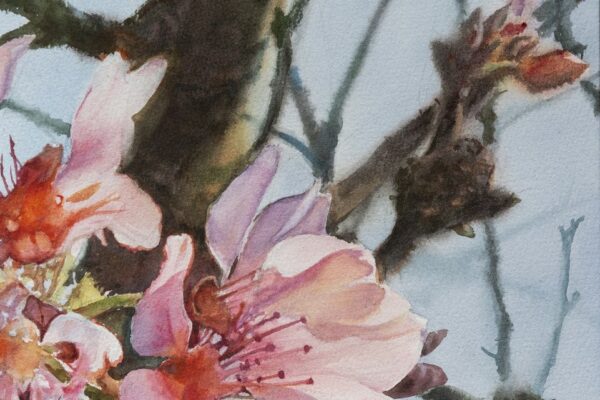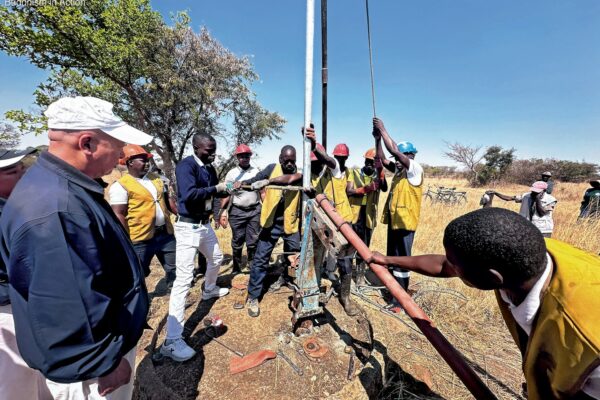By Xie Su-zhu
Translated by Wu Hsiao-ting
Photos courtesy of Xie Su-zhu
Despite many challenges, Hong Yu-nian devoted her life to family, charity, and spiritual practice, leaving a legacy of compassion and service. This is a reflection on her life by one of her daughters.
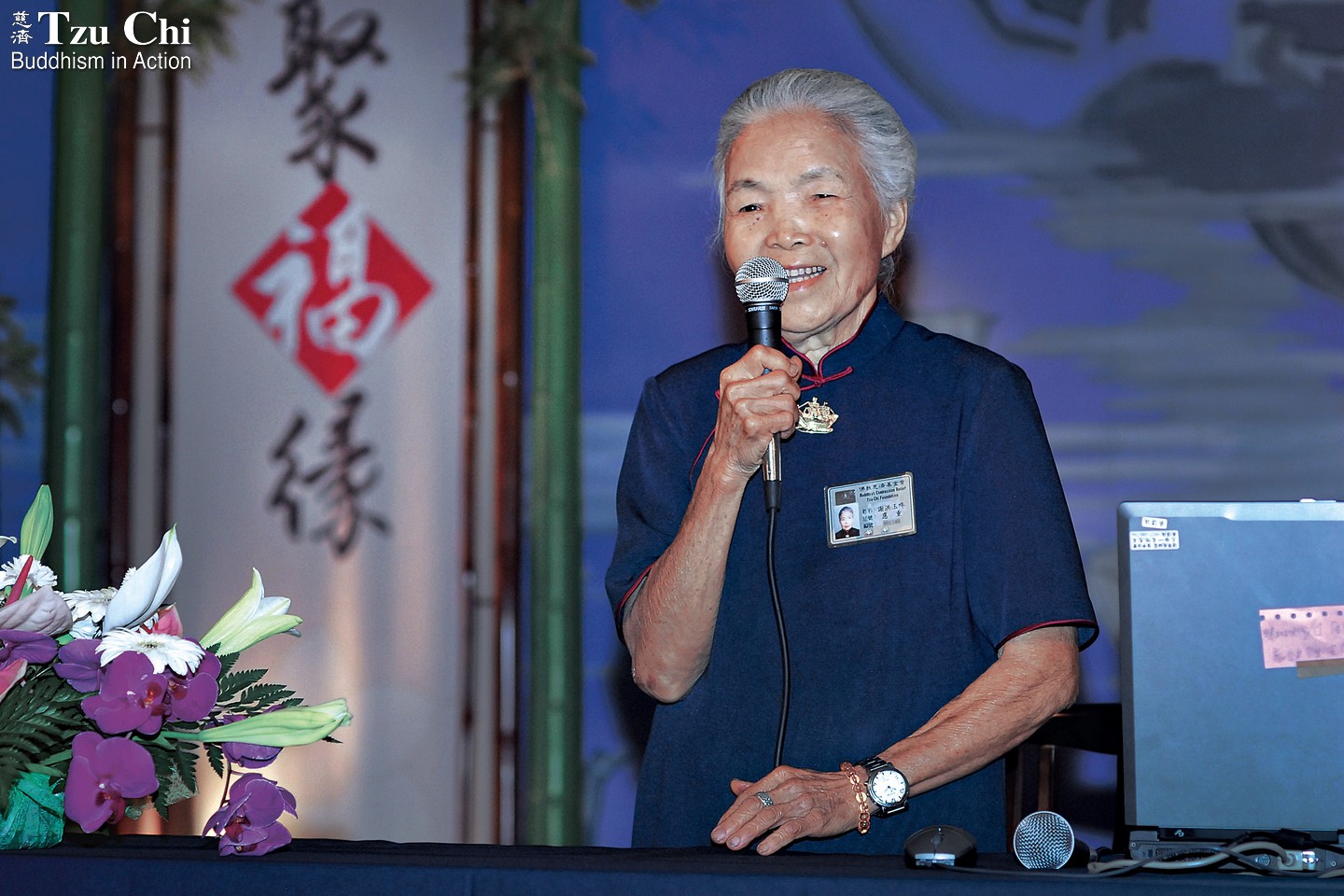
My mother, Hong Yu-nian (洪玉哖), had three occasions in her life when she wished to leave home and become a Buddhist nun. But each time, circumstances prevented her from fulfilling her wishes.
She was born in central Taiwan on March 14, 1926, in the rural village of Xinzhuang, Caotun Township. She grew up during a time of widespread poverty. The traditional preference for sons over daughters stifled her hopes of receiving an education. Instead of attending school, she and her elder sister spent their days tending cattle in the fields and managing household chores. The fates of her brothers were vastly different. My grandfather even sold land to send his second son to Japan, where he studied to become a pharmacist. Later, his youngest son completed medical school, bringing further honor to the Hong family, now proud to have a pharmacist and a doctor in the family.
From a young age, my mother watched her own mother suffer from illness. In their harsh environment, medical care was hard to come by, and my mother quickly learned that life was filled with suffering. She once sought refuge in a temple, pleading with a monk to let her shave her head and become a nun. However, my grandfather firmly opposed her decision and brought her back home. This was her first missed opportunity to enter monastic life.
In 1945, at the age of 19, my mother married my father, Xie Song-fu (謝松釜), a carpenter. Together they had three sons and four daughters. Even as a married woman with children, she never abandoned her desire to become a nun. However, with young children to care for, she realized she had to put her wish to become a nun on hold yet again. Instead, she learned carpentry skills—such as planing, sawing, and painting—from my father. They worked diligently together, making a living by producing furniture, school desks, and chairs.
My father was an honest man who worked with integrity. Although their income was modest, they always maintained their standards. My mother was meticulous in managing the household, carefully watching every penny to make ends meet. To supplement the family’s income, she took on various home-based manufacturing jobs. When my father later fell ill with a chronic condition, she would wake up at 4 a.m. to buy wholesale vegetables and fruit from the market, selling them at a roadside stall along with joss paper. If she couldn’t sell all the produce, she would push her bicycle through the streets, calling out to sell the remaining items, often returning home after nightfall.
In 1990, my father passed away at the age of 66. My mother was devastated, losing all attachment to life. For a third time, she expressed her desire to leave home and become a nun. We, her children, couldn’t bear the thought of her leaving us for monastic life. In response, we urged her to devote herself more fully to Tzu Chi, a Buddhist charity organization which offered a path to embrace the Bodhisattva Way. She had been involved with Tzu Chi for some time, but from that time on, her heart and mind were even more dedicated to Tzu Chi. Whenever we visited her, we had to make appointments in advance, as she was often too busy with her volunteer work to see us.
Hong Yu-nian and her husband, Xie Song-fu, were devoted Buddhists who had both received the Bodhisattva Precepts.
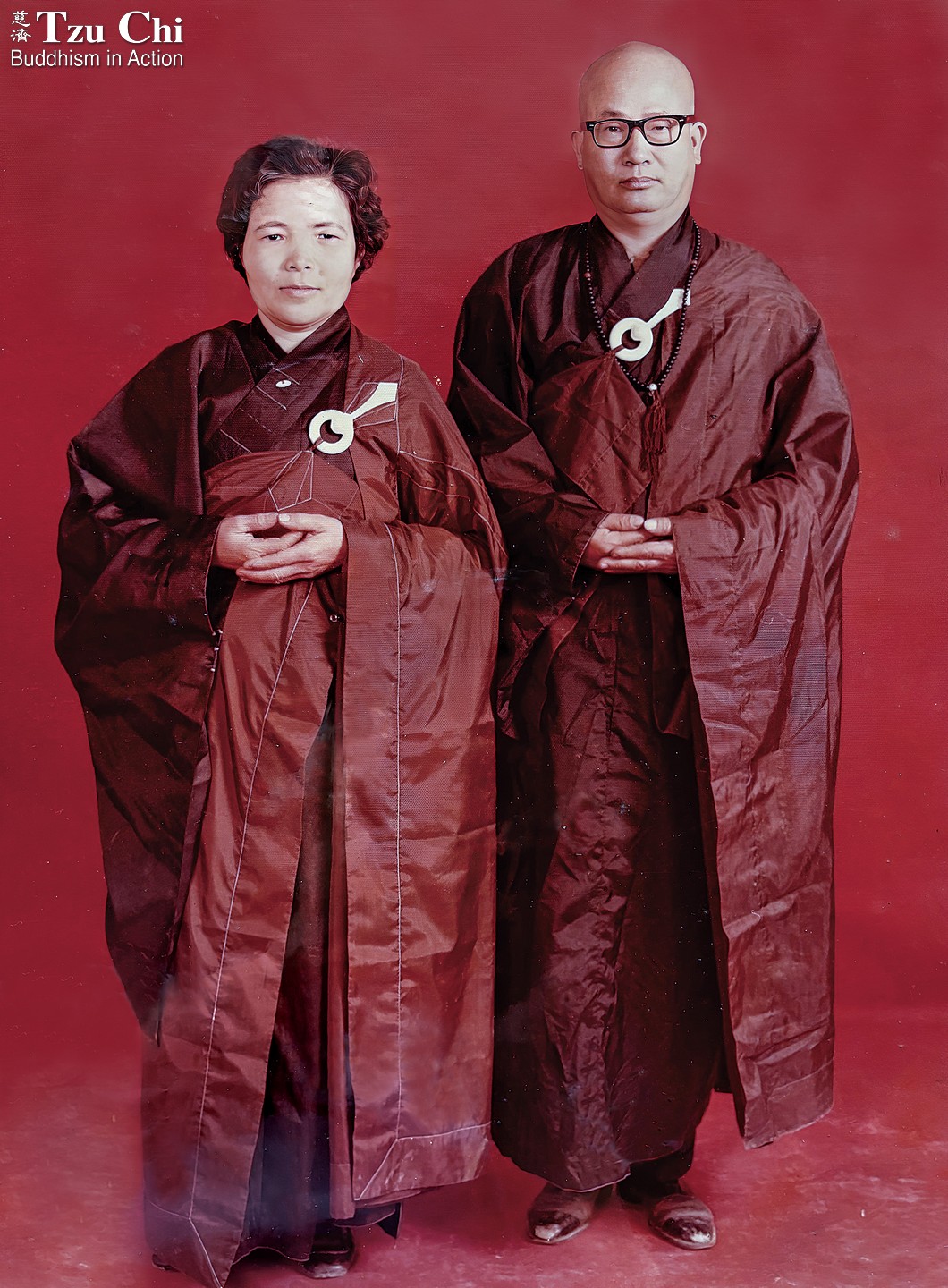
Devoted to good deeds
My mother found her illiteracy a hardship, which is why she placed great importance on our education. She often told us that even if she had to beg, she would ensure we all attended school. Due to our financial constraints, each time the seven of us were to register for a new semester, she had to borrow money from relatives, friends, or private lending clubs to cover the enormous school fees. My uncle, a practicing doctor, often supported our education. He became an important benefactor in our lives, and we will always remember his kindness. My mother’s commitment to our education bore fruit; each of us completed higher education. My brother Xie Hui-long (謝輝龍) now serves as the superintendent of Chu Shang Show Chwan Hospital in Nantou County.
A devout Buddhist, my mother had been vegetarian from an early age. She learned to chant scriptures, strike ritual percussion instruments, and could recite quite a few Buddhist texts. Even though she led a frugal life, she did everything possible to support Buddhist temples and monasteries. Zhang He-zhen (張河圳), the first Tzu Chi volunteer in Caotun Township, often visited our home to share Dharma Master Cheng Yen’s teachings and updates on Tzu Chi’s work. When the foundation was building a hospital in Hualien, an area with limited medical resources, my mother visited the Jing Si Abode, the Buddhist convent founded by Master Cheng Yen. Inspired by her visit, she quickly raised 300,000 NT dollars (approximately US$10,000) to support the hospital’s construction. In 1989, she became a Tzu Chi commissioner—a role that requires training and establishing a roster of regular donors. Though my siblings and I had already achieved success in our respective careers, she chose not to live in comfort; instead, she devoted herself to following the Master and helping the less fortunate.
In 1990, when Master Cheng Yen called upon her followers to engage in recycling to protect the environment, my mother didn’t hesitate. She threw herself into the cause with full devotion. As she pushed her cart through the streets and alleys, selling vegetables she grew and wholesale fruits, she also collected recyclables like PET bottles and cardboard boxes. She was once hit by a bus during her recycling efforts, requiring hospitalization. On another occasion, a young man on a motor scooter approached her, pretended to hand her a PET bottle, then snatched her gold necklace. The force of the robbery caused her to fall and injure herself. Despite these incidents, her commitment to Tzu Chi’s recycling mission never wavered.
My mother was an exceptional cook. She could recreate any dish she tasted, earning her a reputation for culinary excellence. When my eldest and second brothers got married, she personally prepared the meals for the guests. Her talent for cooking was not only cherished by our family but also put to good use for charity. Whenever Tzu Chi organized disaster relief efforts, she made vegetarian zongzis (wrapped rice dumplings), soups, bamboo shoot buns, or other food items for fundraisers. Even now, we, her children and grandchildren, fondly remember the taste of her dumplings and nourishing herbal soups—no one could match her cooking.
Having lived through World War II, my mother had deep empathy for disaster victims. Beyond making food for fundraisers, she actively raised money for Tzu Chi’s disaster relief efforts, soliciting donations at every opportunity. This was in addition to her regular monthly work of collecting donations from the roster of donors she had established. When it was time to collect these donations each month, she would ask my brother Xie Hui-long or my sister Xie Su-fen (謝素芬) to drive her and her cart to Xinzhuang. Once dropped off, she would collect donations and recyclables along her route, walking back to downtown Caotun, a distance of over ten kilometers (6.2 miles). Sometimes, it was as late as 11 p.m. when she returned home, demonstrating her remarkable perseverance and dedication.
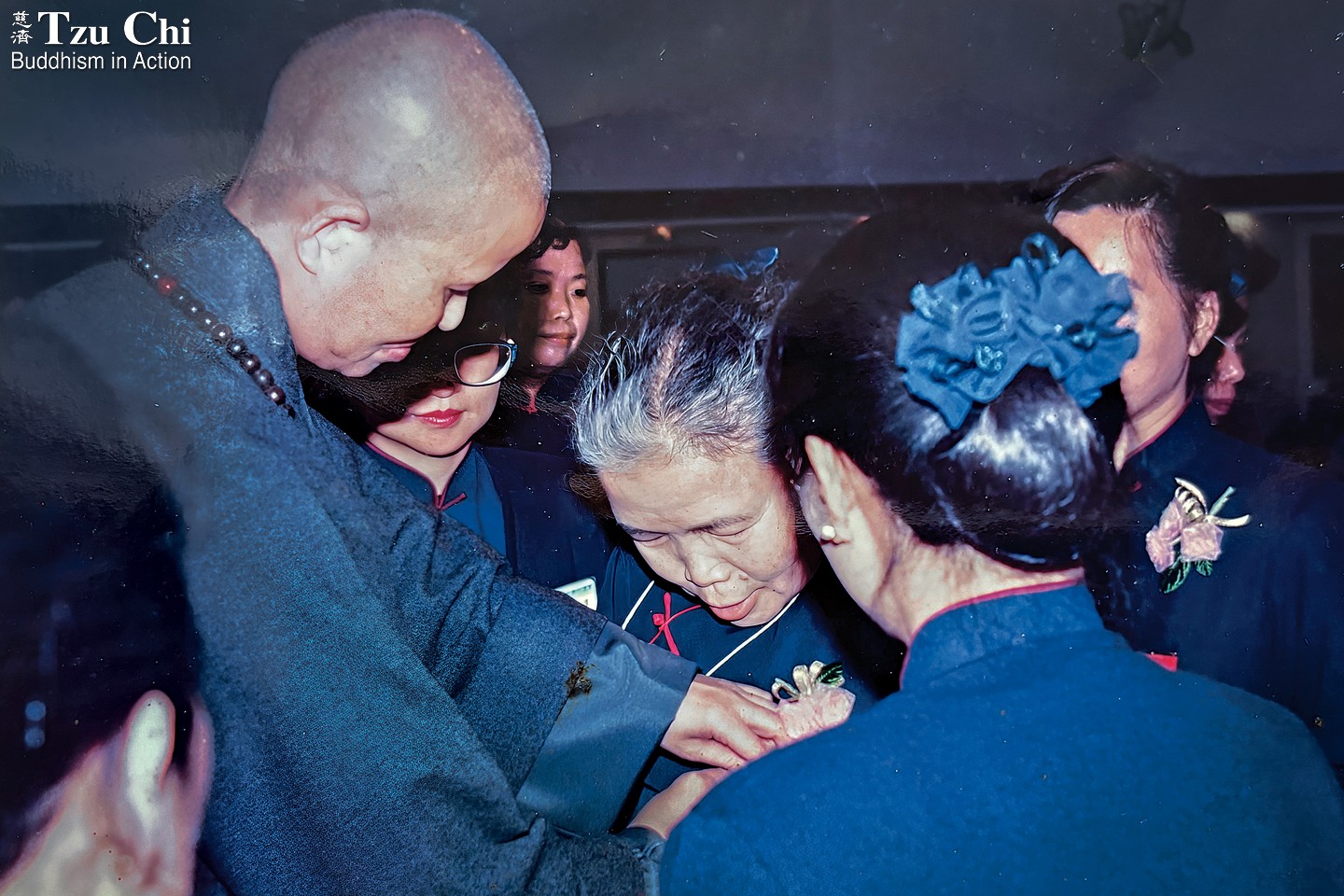
Hong was always generous. She is pictured here receiving her certification as a Tzu Chi Honorary Board Member in 2005, an honor given to those who have donated a million NT dollars (US$33,300) to Tzu Chi.
Age is not a problem
My mother’s dedication to charity work touched the hearts of many in Caotun, and nearly 500 people became Tzu Chi donating members because of her. Because she couldn’t read or write, in the beginning she relied on others to record the donations she collected. Determined to improve, she enrolled in night school to learn how to read and write. In three years, she never missed a single class. She was even awarded a certificate for academic excellence upon graduating.
She loved serving as a hospital volunteer, and during her active years, she volunteered at Tzu Chi’s hospitals in Hualien, Dalin, and Taichung. When she first started at Hualien Tzu Chi Hospital, she worked in the basement sewing bed sheets. Later, she moved to the wards, where she used her life experiences and Buddhist teachings to comfort patients. She felt a deep sense of accomplishment whenever she could bring a smile to a patient’s face. During a volunteer morning meeting while serving at Hualien Tzu Chi Hospital, she bravely shared her life story. It was only then that everyone realized what an extraordinary life she had led, fully embracing the Dharma and living it out in her actions.
Even in her 70s, she was eager to join Tzu Chi’s free medical clinics overseas. Master Cheng Yen, concerned about her age, initially wouldn’t let her go on long journeys. Determined to prove her capability, my mother climbed Mount Huang in China and sent a photo of herself on the mountain to Master Cheng Yen. This finally earned her permission to volunteer abroad. In 2003, at the age of 77, she joined my brother Hui-long on a medical mission to Indonesia. When others expressed concern that she might tire herself out and suggested she take breaks, she confidently replied, “I didn’t spend all that money on a plane ticket to rest—I’m here to work.”
In 2005, Tzu Chi’s Da Ai TV produced a drama series based on her life. Since she already knew her own story, she didn’t see the need to watch it. Instead, she used the time to collect recyclables, often late into the night. My brother, worried about her failing eyesight and the dangers of being out after dark, would often go looking for her. Master Cheng Yen, aware of our concerns, gently asked her to watch the drama each evening. It was only then, out of her deep devotion to the Master, that she began coming home early to watch the show.
Eighty-year-old Hong assists in laying interlocking bricks during the construction of Taichung Tzu Chi Hospital in 2006. Cai Feng-bao
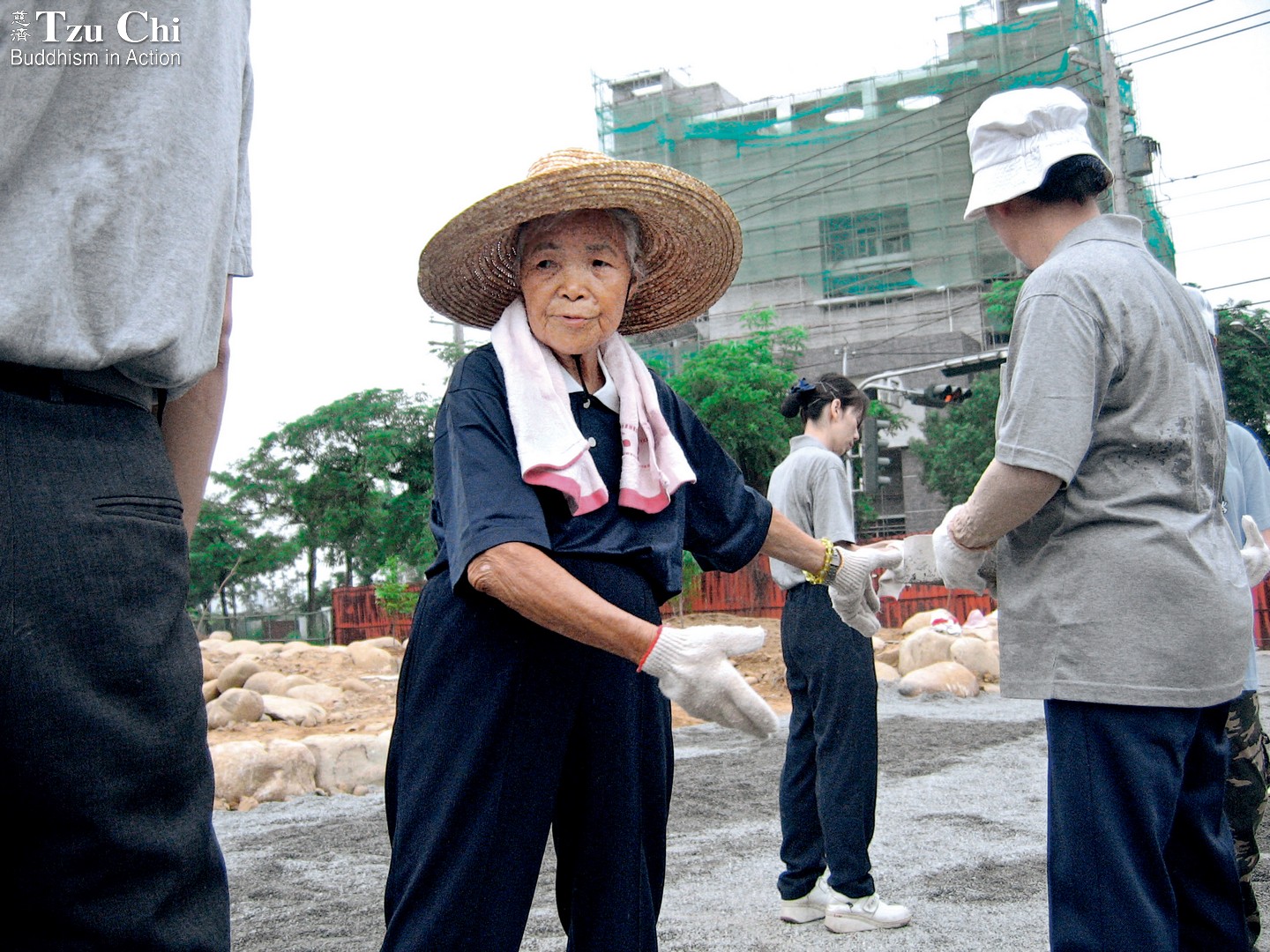
Guiding us in doing good
My mother remained steadfast in following the teachings of the Buddha and Master Cheng Yen into her 90s, continually seeking to inspire kindness and deepen her spiritual practice. Despite battling dementia and nearly losing her sight, she persisted in listening to the Dharma. She could still recite the Heart Sutra, the Great Compassion Mantra, and the Amitabha Sutra until her final moments.
After a surgery at age 91, she moved in with my sister, Xie Su-ying (謝素英), a nurse and associate professor in the School of Nursing at Chang Gung University. Su-ying would take her to group chanting sessions and to volunteer at Tzu Chi’s recycling station. Feeling that she was not doing enough, my mother often expressed a desire to go out and solicit donations.
On August 3 of this year, she passed away at home, having faithfully upheld her conviction that it is better to wear out than rust out. During her life, she exemplified the Six Paramitas taught by the Buddha: giving, moral discipline, patient endurance, diligence, meditation, and wisdom. She was recognized as a national model mother and was honored with the “Good People, Good Deeds” award. To me, she epitomized a life well-lived.
My mother worked tirelessly for our family throughout her life, and her overexertion may have affected her health. In her 30s, she suffered from severe uterine bleeding. After her surgery, my father consulted a fortune teller who, after two readings, declared emphatically that the person in question was no longer alive. When he realized she was standing right before him, the fortune teller was astonished, exclaiming, “There are two kinds of people whose fates cannot be predicted—those who engage in spiritual practice and those who constantly do good deeds.”
Even during our family’s financial struggles, my mother remained generous and charitable. Her example profoundly influenced us, leading my siblings and me to become Buddhists and find joy in helping others. I am deeply grateful to her for leading us to Tzu Chi. While I may never match her unwavering and diligent dedication to charitable work, she continues to inspire me not to be idle. She often said, “Master Cheng Yen carries a heavy burden. Each of us must help shoulder the load.”
Over 500 people came to pay their respects at her funeral in our hometown of Caotun. My mother had a noble aspiration to dedicate her next life to the path of a Buddhist monastic, spreading the Dharma and benefiting others. I believe she has already begun that journey.
Hong pushes her cart to sell vegetables and fruit while collecting recyclables from the streets for environmental conservation. Lin Yi-ze
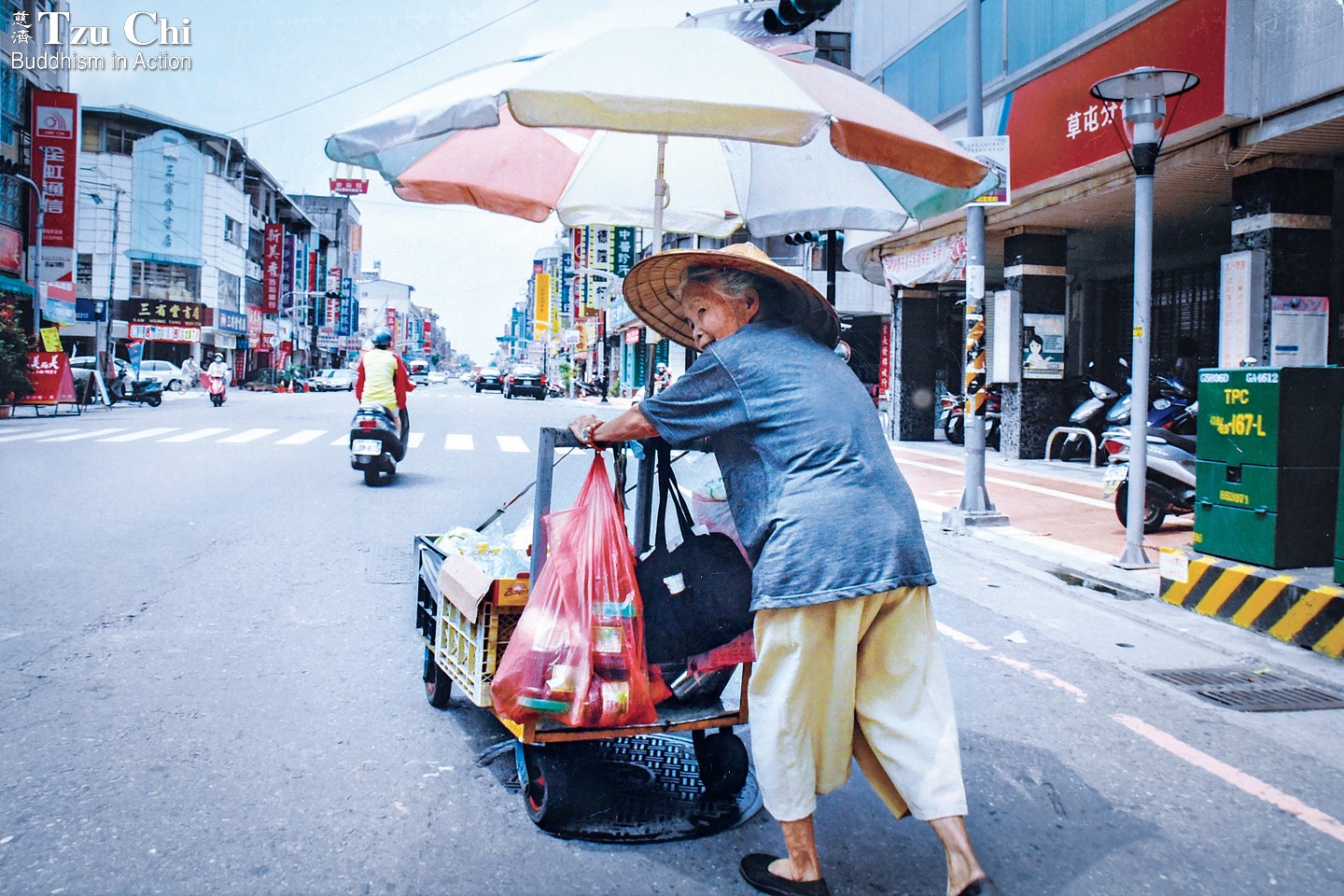
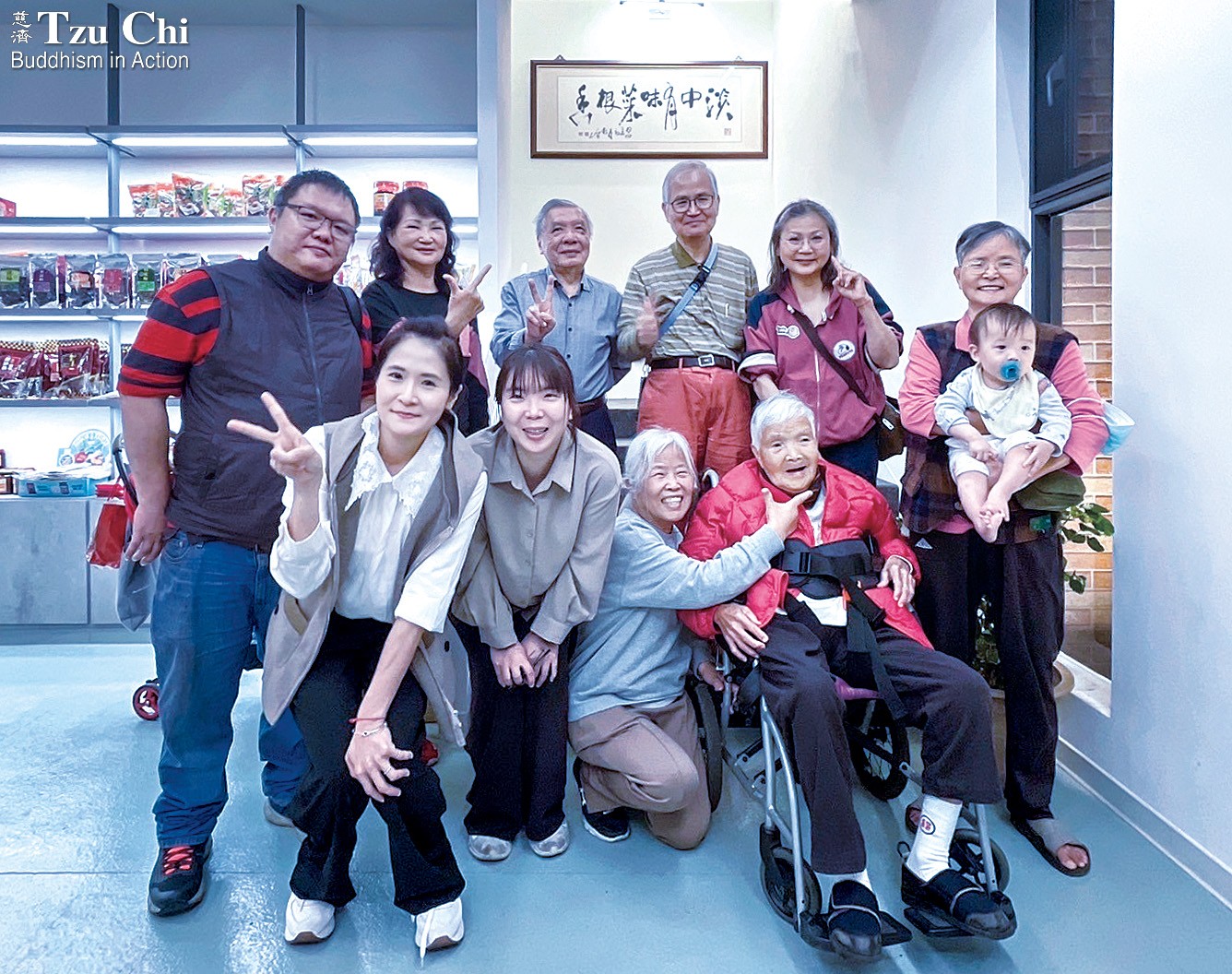
Hong poses with her children and grandchildren. She was nearly 100 when this photo was taken. Courtesy of Xie Hui-long

